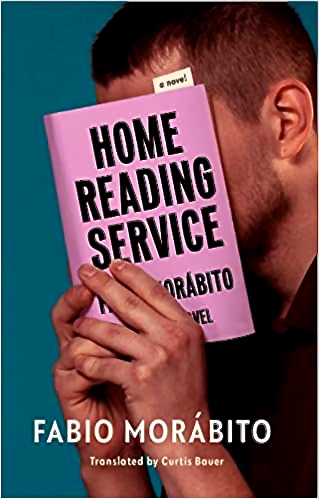Note: This novel by Fabio Morábito was WINNER of the Xavier Villaurrutia Prize, Mexico’s highest literary award.
“ ‘My father doesn’t know anyone.’ It was the second time that phrase had materialized on my lips, and I thought it was a line of poetry, that’s why I wrote it down….I had no idea what line could follow, one similarly categorical or one that spelled things out. Poetry is so difficult; the world must be full of first lines like mine, which launched a poetic career, while at the same time bringing it to a close.” – Eduardo Valverde, speaker and main character.
 While this sentiment by Eduardo Valverde may not strike the reader as particularly “poetic,” it signals a new, positive direction in the speaker’s thinking. Main character Eduardo is not a writer, and, in fact, he is not much of a reader, either, though he has attended college. Eduardo is currently serving the equivalent of a one-year prison sentence for some undisclosed crime, but he is not in prison, thanks to the intervention of a local priest. Fr. Clark convinced the authorities to have Eduardo assigned to work for that year with people who cannot read, either for physical or emotional reasons, instead of being imprisoned. Seven families are assigned to him, and he is expected to read to each of them for one hour each week. His biggest problem, and hence, the biggest problem for his assigned listeners, is that he gets tired of reading shortly after he starts each book, and is unable to convey the feelings which the varied books should convey to their even more varied listeners. They become bored as Eduardo becomes bored.
While this sentiment by Eduardo Valverde may not strike the reader as particularly “poetic,” it signals a new, positive direction in the speaker’s thinking. Main character Eduardo is not a writer, and, in fact, he is not much of a reader, either, though he has attended college. Eduardo is currently serving the equivalent of a one-year prison sentence for some undisclosed crime, but he is not in prison, thanks to the intervention of a local priest. Fr. Clark convinced the authorities to have Eduardo assigned to work for that year with people who cannot read, either for physical or emotional reasons, instead of being imprisoned. Seven families are assigned to him, and he is expected to read to each of them for one hour each week. His biggest problem, and hence, the biggest problem for his assigned listeners, is that he gets tired of reading shortly after he starts each book, and is unable to convey the feelings which the varied books should convey to their even more varied listeners. They become bored as Eduardo becomes bored.

Eduardo’s clients preferred Capote to Kafka.
As the novel begins, two elderly brothers are listening to Crime and Punishment. One of the men is regarded as intellectually limited; the other is a ventriloquist who sometimes supplies information for his brother. Eduardo soon begins to wonder about both of these men – who is really in charge and who is really doing the speaking? Another family assigned to Eduardo is deaf – or at least the parents are. Eduardo’s experience with them indicates that the three little children can hear, though they do not attend school and cannot read or write. During this family’s lesson, all are reading lips as they listen to The Mysterious Island by Jules Verne. Another client is wheelchair-bound, following an accident several years ago, and is listening to Henry James’s The Turn of the Screw, until she suggests that Daphne du Maurier’s My Cousin Rachel might be more involving. Other characters assigned to Eduardo are more social, with one couple inviting three other couples to come listen to Eduardo reading Kafka’s Metamorphosis, which quickly changes to Truman Capote’s Breakfast at Tiffany’s, which they think would be more fun. None of the listeners are completely satisfied with Edwardo’s choices or his reading style.
At home Eduardo’s father, who is suffering from cancer, is a great fan of poet Isabel Fraire, which leads Eduardo himself to read some of her poems, an experience which changes his whole outlook on reading aloud and creates a noticeable difference in the way he approaches reading itself. He is so impressed with Fraire’s poems that he suggests to Colonel Atarriaga, another client, that he might want to read one of these poems, instead of wading through The Tartar Steppe by Dino Buzzati. The Colonel listens to a poem and promptly falls asleep, leaving his house open for exploration, an opportunity that provides Eduardo with a way out of some personal difficulties.
Cuernavaca, Mexico, the setting of the novel, is suffering from a breakdown of the old social values, and author Morábito uses the novel to depict some of the corruption which affects Eduardo directly. Eduardo and his family have owned a furniture store for more than twenty years, and must pay protection money to a crook, whom they know. The only way they can do this is by having Eduardo participate in a financial juggling act in which he is “borrowing” from one person (sometimes without asking) in order to keep another person in check, and when that person’s life is in danger after being robbed, Eduardo needs to create a coverup to keep all the balls in the air at the same time. The cast of characters grows, but Morábitao does a fine job of individualizing them so that the details their lives do not become hopelessly confused.

Author Fabio Morábito, winner of the Xavier Villaurrutia Prize, Mexico’s highest literary award for this book.
Despite including a broad cast of characters and non-stop activity, author Morabito never forgets his primary theme about reading and writing, and the novel has something for everyone. The subplot involving poet Isabel Fraire winds through the novel, with questions arising about whether Eduardo’s father knew her, and the long-term effects of her work on those in the cast of characters who become familiar with her work. There is a love story or two, and the sadness of Eduardo’s father’s impending death keeps the humor grounded. When several of Eduardo’s clients drop out of the reading program, the future for Eduardo looks questionable, but a grand finale at a bookstore is coming, and it is truly grand, and unexpected. Full of energy, humor, literary references, and themes to ponder about why we read and what we read, Home Reading Service offers unique visions of readers and writers, and as Eduardo serves his time for his undisclosed crime, readers, universally, will see echoes of themselves and their own attitudes toward books and authors as they participate in his story.
Photos: The portrait of Isabel Fraire (1934-2015) appears on https://second.wiki
Cuernavaca in spring is from https://universaldomainexchange.com
Author Fabio Moráabito’s photo may be found on https://www.eselibro.es


